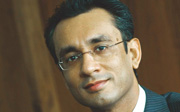UTI International (Singapore) is readying a long-biased Indian equities fund. Stefanie Eschenbacher talks to Praveen Jagwani, chief executive.
“Eye-poppping” is how Cerulli Associates once described growth in India’s asset management industry.
Its assessment, entitled Indian Asset Management Profitability, also highlighted that the landscape had changed dramatically since groundbreaking rules introduced in 2009 prohibited the payment of commissions to intermediaries out of front-end charges on funds. This had an immediate impact on retail inflows to asset managers, many of which pulled out of the market.
Nevertheless, it appears that the fundamentals for asset management in India, including international houses that want to tap into the market, are broadly favourable.
Assets under management as a percentage of gross domestic product are predicted to increase by 57.2% by 2014.
UTI Asset Management Company is one of the largest retail asset managers in India, with more than 10 million investor accounts and assets under management of close to $12 billion (€9.6 billion). Established in 1964 as the Unit Trust of India by an Act of Indian Parliament, it has one of the largest market shares of domestic assets and retail clients while also being one of the first pension fund managers there.
India and beyond
As the Indian giant started to look abroad, it established UTI International in 1996. Head quartered in Guernsey, it has branches in London and Dubai.
It has two subsidiaries, UTI Investment Management Company (Mauritius) and UTI International (Singapore).
Praveen Jagwani, chief executive officer of UTI International (Singapore), says his parent company has a clear home advantage in India. But when it comes to broadening the distribution network and gathering assets outside India, he faces the same challenge that other international fund managers do.
Indian equities, Indian fixed income and Indian private equity are the core offering. UTI also launched the first ever India fund outside the country in 1986, the Mauritius domiciled UTI 1986 India Fund.
Foreign asset managers have encountered more challenges in India than elsewhere in the world, owing to regulatory reasons. Though the country has various tax treaties, Jagwani considers the treaty with Maurituis to be the most favourable one.
UTI International is about to launch a long-biased India equity fund. The Dublin domiciled fund will launch as a Ucits structure on a Milltrust International managed account platform.
“Most regulators arem comfortable and familiar with the Ucits scheme,” he says. “Including North America, Ucits funds are sold almost everywhere, like the Middle East, Asia and Africa.”
The idea of an Asian regional funds passport scheme – which is currently being developed and scheduled for launch in the second half of this year – is interesting for Jagwani, though he says Ucits is so established that it will be difficult for Asia to develop a concept that is innovative and competitive. One of Jagwani’s strongest arguments for Ucits are that it is a well-established and trusted brand; the funds can be sold in many key markets; and the system gives asset managers access to a larger pool of capital, which makes gathering assets easier.
“Ucits is here to stay,” he says. “Asia is less mature and it is not one single, domestic market, which makes passporting a pan-Asian Ucits scheme difficult.”
Local expertise
Selling the firm’s India capability largely centres on the country’s growing wealth and on a fund management team based in India.
Despite economic challenges, China has overshadowed India in the pas few years owing to its spectacular growth and emerging middle class.
“China is growing faster, but much of the growth has happened on the back of irresponsible lending. China’s wealth is polarised, whereas India’s is relatively more widely distributed,” he says.
“China is building ghost cities and miles of solar panels where the closest grid is 1,000 kilometres away. This is an inefficient allocation of resources.”
In India, poverty is still widespread, especially in rural areas. Its economy, however, is growing fast, at least compared with the developed world.
The sub-continent is home to the world’s second largest population and prides itself with being the largest democracy.
Jagwani says some stocks in India have delivered triple digit returns, making it a stock picker’s market.
There are 7,000 listed stocks in India, he says, of which 1,200 are actively traded. Others are not traded or widely held because they are small or micro caps.
For about 200 of these stocks, research is available. “We cover 450 names, which gives us the ability to move up and down the market capitalisation spectrum. This is a unique advantage.”
Jagwani says on-the-ground research and local expertise are what distinguishes UTI from other international asset managers.
Conceding that performance was somewhat subdued over the past year, Jagwani points to the fact that emerging markets investments should be made for the long term.
“As of now, we would create the right vehicles and then collect the money from everywhere,” he says.
Jagwani has been chief executive officer and executive director for more than three years, having previously worked in India, Australia, the UK and Bahrain.
©2012 funds europe





